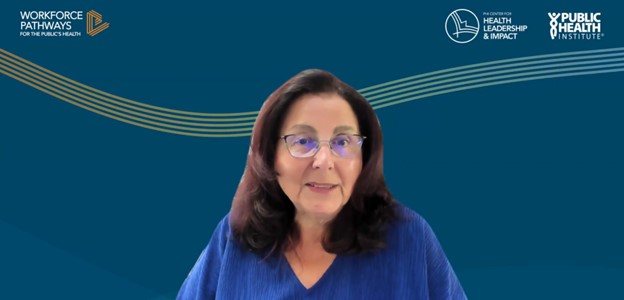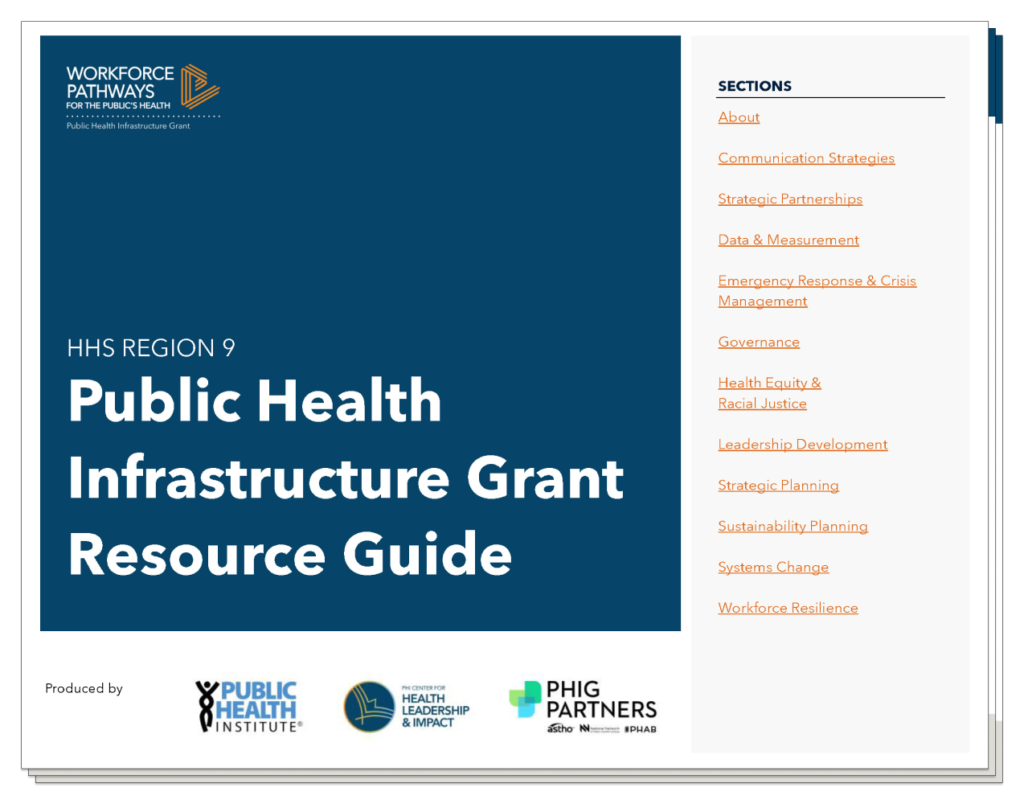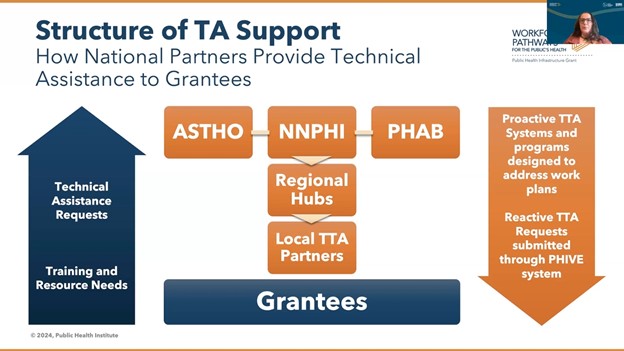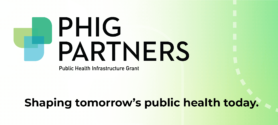PHI’s Virtual Technical Assistance Launch Event Connects Region 9 Health Departments with Partners & Tools Needed to Drive Change
- By: Chloe Lake
- Date

Carmen Rita Nevarez, MD, MPH, Co-Director PHI Center for Health Leadership & Impact, welcomes participants with a keynote address.
On February 29, 2024, PHI Center for Health Leadership & Impact (CHLI) hosted Region 9’s first virtual Public Health Infrastructure Grant (PHIG) Technical Assistance Launch in partnership with the National Network of Public Health Institutes (NNPHI). CHLI, a program of Public Health Institute, serves as NNPHI’s PHIG Hub for Region 9, and provides technical assistance for PHIG recipients in California, Arizona, Nevada, Hawai’i, American Samoa, the Commonwealth of the Northern Mariana Islands, the Federated States of Micronesia, Guam, the Republic of the Marshall Islands, and the Republic of Palau. “CHLI is pleased to serve as the Region 9 Hub and harness the capacity of PHI and other regional partners. We are committed to building healthy, equitable communities and creating sustainable impacts at scale,” noted Karya Lustig, Director, Strategy and Implementation.
The virtual Technical Assistance Launch brought together nearly 70 people, including staff from 16 state, county, and city health departments, which represented all but one recipient health department in the region. The event also included representatives from organizations who provide training and technical assistance to PHIG recipients, such as:
- Hawai’i Public Health Institute
- PHIG National Partners: NNPHI, the Association of State and Territorial Health Officials (ASTHO), and the Public Health Accreditation Board (PHAB)
- Key PHI programs and centers, including the Population Health Innovation Lab, the Cypress Resilience Project, and the Center for Wellness and Nutrition
This virtual convening created an opportunity for technical assistance providers to receive pivotal insights from health departments on the types of assistance they need, while also giving health departments immediate resources to expand their work independently or request technical assistance from local and national partners. “Our intent with this event was to give health departments access to the knowledge, tools, and resources they need to make meaningful change within their departments,” said Rachel Fogleman, PHIG Program Coordinator with CHLI.
Those resources have been well-received: since the event, one health department in California has already requested the PHI Population Health Innovation Lab present at their 500+ person conference on public health core competency evaluation, while another contacted the PHI Cypress Resilience Project for additional resources after participating in their breakout session. Shaena Rouse, Senior Program Manager with CHLI, noted, “In addition to the technical assistance requests, nearly one-third of participants downloaded the resource guide before the end of the event, and nearly all participants asked to be added to the Hub’s email list to receive information about upcoming technical assistance opportunities.”

The Region 9 resource guide is available for download.
EVENT HIGHLIGHTS
The team at CHLI struck a balance between information-sharing and interactive sessions and structured the event carefully to keep their virtual audience engaged. While not a replacement for in-person events and meetings, well-structured virtual events such as this one serve as critical tools to build or maintain interagency relationships, share complex information, and foster collaboration. Embracing virtual platforms as integral components of engagement strategies enhances organizations’ agility, inclusivity, and ability to drive meaningful change.
Agenda highlights of the Technical Assistance Launch included:
- Introduction to the Region 9 Innovation Hub: Attendees met the Region 9 Innovation Hub and Spoke team and learned more about the technical assistance process, including tips on crafting technical assistance requests and how to engage in upcoming technical assistance in the region.
- “Taste of Technical Assistance” Breakout Sessions: Technical assistance partners from PHI’s Population Health Innovation Lab, Cypress Resilience Project, and the Center for Wellness and Nutrition provided one-hour sessions on evaluating public health core competencies, workforce resilience, and data for impact, respectively. Sessions were offered twice, and participants had the opportunity to explore and sample resources offered by partners.
- PHIG Workplan Learning Groups: The Hawai’i Public Health Institute facilitated two learning group sessions focused on workforce development and foundational capabilities. The learning groups provided health department attendees a platform to discuss their specific infrastructure needs, brainstorm solutions, and share successes and lessons learned related to their PHIG workplans.
- National Partners Panel: Representatives from NNPHI, ASTHO, and PHAB provided a 30-minute panel presentation on upcoming technical assistance opportunities available to PHIG recipients across the country. The panel also shared data on technical assistance offerings in Year 1, highlighting the reach, availability, and utilization of assistance opportunities by health departments.
- Region 9 PHIG Resource Guide Launch: The Hub (PHI) collaborated with multiple partners during Year 1 to identify technical assistance resource providers in Region 9. The Hub then curated resources, including recorded webinars, toolkits, publications, and curricula, into the Region 9 PHIG Resource Guide, which launched in conjunction with the event. The resource guide contains links and descriptions to over 70 resources on PHIG-related topics and is available to download for free through the Region 9 Hub webpage.

Karya Lustig, Director of Strategy and Implementation, explains how technical assistance is coordinated and delivered through the hub model.
NEXT STEPS
Recordings, handouts, and resource lists from the event will be available online in the coming weeks. The CHLI team is leveraging the insights they gained on February 29 by turning their attention to delivering proactive technical assistance offerings to address needs expressed during the event and for their in-person convening later in the year. Health departments in Region 9 can find out more about upcoming events by signing up for the Region 9 PHIG newsletter and visiting the Region 9 Hub webpage to view a calendar of technical assistance offerings.
Karya Lustig, Director, Strategy and Implementation, reflected on how CHLI can best support PHIG work moving forward, sharing, “I am confident that CHLI can offer unique and valuable support as a public health ‘do tank’ that helps individuals and teams transform their vision into data–driven strategies. Our adaptive program design creates space for active community participation and for leaders to build partnerships. We look forward to partnering on the transformative work ahead.”
LEARN MORE
More information and resources related to the Public Health Infrastructure Grant can be found at PHInfrastructure.org. More information about PHI can be found at PHI.org.
This work is supported by funds made available from the Centers for Disease Control and Prevention (CDC) of the U.S. Department of Health and Human Services (HHS), National Center for STLT Public Health Infrastructure and Workforce, through OE22-2203: Strengthening U.S. Public Health Infrastructure, Workforce, and Data Systems grant. The contents are those of the author(s) and do not necessarily represent the official views of, nor an endorsement, by CDC/HHS, or the U.S. Government.

 Subscribe To Our Communications
Subscribe To Our Communications